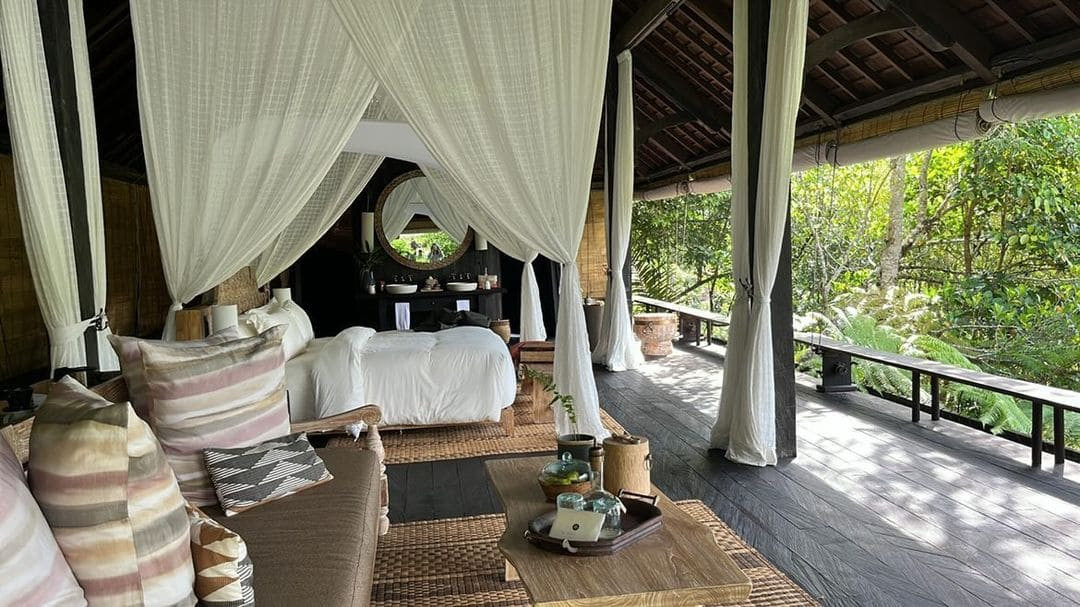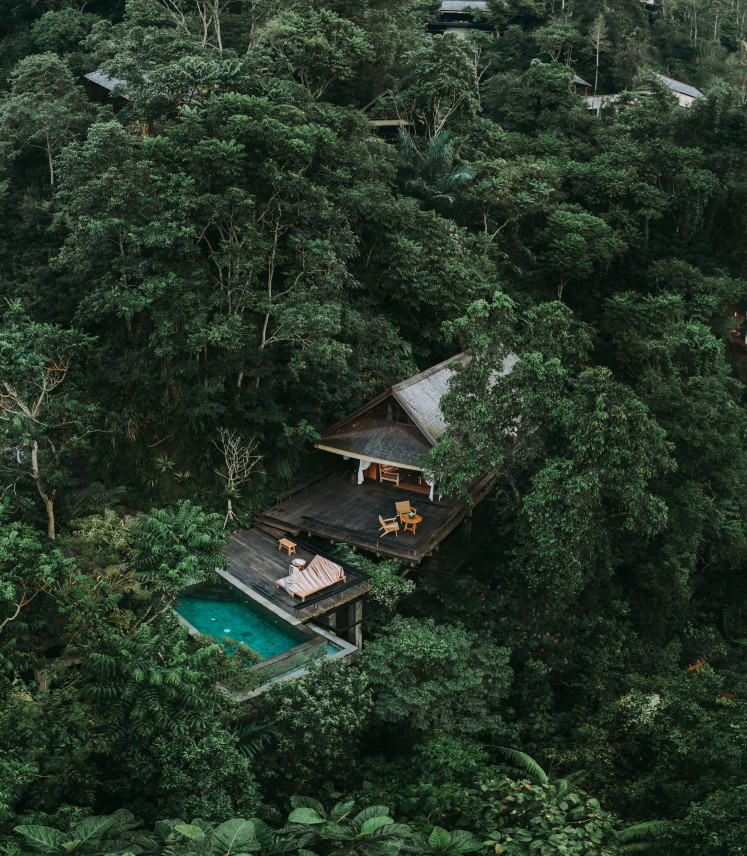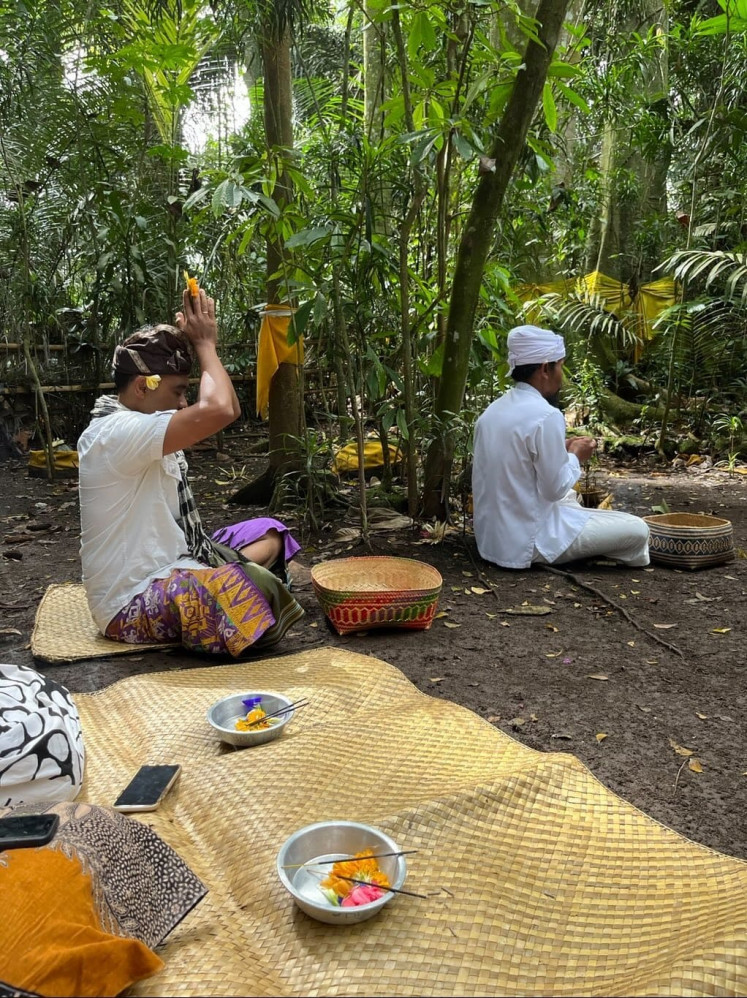Popular Reads
Top Results
Can't find what you're looking for?
View all search resultsPopular Reads
Top Results
Can't find what you're looking for?
View all search resultsReconnecting with nature at Buahan, a hotel without walls
Combining nature and sustainable design, the resort aims for a “naked” experience for guests to reconnect with the natural world.
Change text size
Gift Premium Articles
to Anyone
C
ombining nature and sustainable design, the resort aims for a ‘naked’ experience for guests to reconnect with the natural world.
Buahan, a Banyan Tree Escape, is a recently opened hotel in Buahan village, Tabanan, Bali. There are no tall buildings around the facility, just vast nature rich with greenery.
The sound of crickets chirping and frogs croaking further enlivens the atmosphere.
Adhi Nugraha, Buahan’s marketing communications manager, said the hotel was made from ulin wood from Kalimantan sourced from retired fishing boats. Gede Kresna, a sustainable architect based in Bali, designed the building.
The resort seeks to draw on Balinese traditions that have been passed down for centuries.
Connecting to nature
Banyan Tree seeks to allow visitors to immerse themselves in nature, waking up their adventurous side while enjoying the earth-toned furniture, warm lighting inside the room and small bites that are provided by the resort.
“I want guests to immerse themselves in the magical experience that this place can offer. Every one of them shared a different experience,” said Puspa Anngareni, an executive assistant manager of the resort.
“We want you to explore your spirituality because it’s a personal relationship between you and God. We want to minimize the boundaries between humans and nature,” she added.
If the guests are fortunate enough, they can witness the beauty of Bali’s seven peaks in the morning from the 180-degree view. But even amid foggy peaks, guests will still be able to enjoy the view and fresh air of the rainforests. Aside from the flora, guests can also see the fauna that live in the area, like squirrels and birds.
The gauzy curtains draped around the pavilion provide privacy and keep the mosquitos away.
Other sections of the resort offer guests open-garden experiences that include a spa, yoga and foraging activities.
Balinese way of life
Guests can also seek their personal inner peace through the tri hita karana trip. Tri hita karana is a Balinese philosophical concept that encompasses the three most important aspects of life on the island, which include connection with God, nature and humans — these three values serve as a basis for development in Bali.
Guests can be taken to the Sabang Daat shrine located in Taro village, which is believed to have been found by Maharshi Markandeya, who spread Hindu teachings across Bali.
The prayer was led by local spiritual leader Jero Mangku I Ketut Bani. This is the basis for all the rituals held by the Balinese. God gives bounty to humans, and humans express their gratitude by honoring the gods through various rituals.
“You don’t have to follow the rituals, but this is the Balinese way of living,” I Wayan Wardika, the guests' local guide explained. But even so, guests are still able to enjoy the shady trees in the woods.
Guests will also visit the Agung Gunung Raung shrine that’s located 10 minutes away from the first shrine. It’s one of the biggest shrines in Bali and is used for bigger rituals by the locals.
Right at the Agung Gunung Raung shrine, guests learn about the importance of karma.
“If we don’t have enough good deeds that are noted by Sang Suratma, a servant who serves to interrogate the spirit of the deceased people and record all their behavior or human karma while they are alive, we’ll go to hell,” I Wayan Wardika said.
During this trip, guests are also able to plant trees in a pot made of coconut shells, which also serve as natural fertilizer.
The meaning of relationships between humans is also known as pawongan. Conversation between other people, including strangers is key. Food and drink are known to be an ice-breaker for the activity.
“Balinese people are known to have their own drinking culture with tuak, a fermented drink made from coconut, or aren. The purpose is not only to welcome the excitement of meeting new people but also to neutralize what we eat throughout the day,” said I Wayan Eka Sunarya, the resort’s head chef.
Local philosophy: Tri hita karana, the Balinese philosophical concept that connects people with God, nature and other humans, was an inspiration for the resort. (JP/Yohana Belinda) (JP/Yohana Belinda)Food options
The resort offers a sustainable and balanced diet. Puspa noted that the hotel was also trying to minimize the waste from food and sourced nearly everything locally.
"This is because we are committed to sustainability, such as with pineapple. We use the skin to make kombucha," said chef Eka. There is also a cocktail called the koffie martini, which uses leftover ground coffee that has been brewed. The resort gives other leftovers to nearby farmers for their livestock.
The restaurant, situated in a wooden pavilion at the heart of the resort, is called the Open Kitchen. It was designed to invite conversation as part of tri hita karana. They serve mostly Indonesian cuisine and a bit of fusion food.
For lunch, the Open Kitchen offers various traditional Balinese dishes, including betutu (Balinese steamed or roasted chicken or duck in a rich spice mix) and tum (food items wrapped in banana leaves and grilled or steamed).
While for dinner, guests can taste more plant-based meals like grilled cabbage, alongside gluten-free chocolate cake for dessert.
“We want everyone to create an experience more than a resort. We want guests to feel the openness of the space and the people,” Puspa said.













